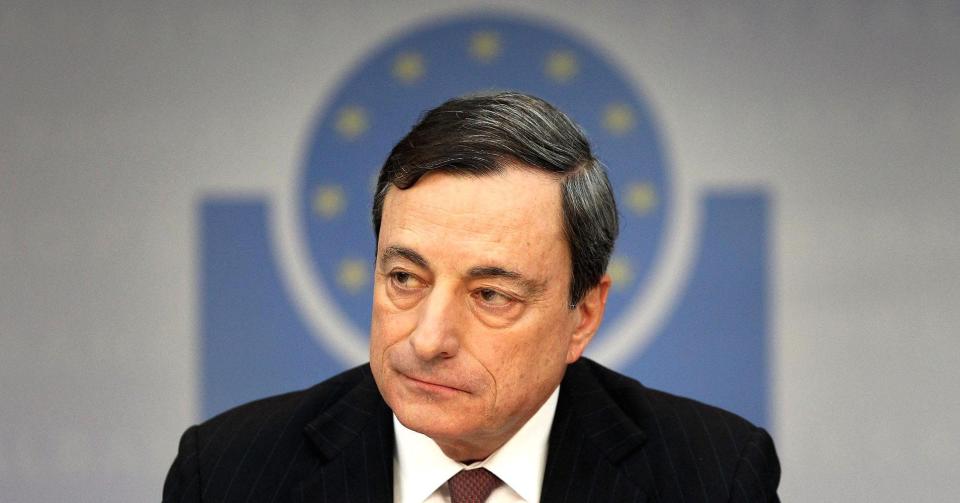Is Draghi about to massively misfire?
It's full steam ahead for stock markets in the run-up to the European Central Bank's (ECB) policy meeting on Thursday, with speculation reaching fever pitch that it could deliver a full-scale quantitative easing (QE) program.
As the World Economic Forum in Davos gets underway, CNBC takes a look at five of this year's key themes in its "5 in 15" series, including monetary policy, with stimulus in Europe set to be the talk of town.
The surprise scrapping of a currency peg on Thursday by the Swiss National Bank (SNB) added fuel to the fire. Analysts hinted that SNB President Thomas Jordan, desperate to avoid struggling to maintain the Swiss currency peg, could have been tipped off on a major policy move in Europe.
With markets trying to price in the ECB's move, the main risk for this week will be the euro weakening and bond yields tightening. And the central bank faces an additional challenge of living up to the months of expectations and the possibility of opposition coming from Germany.
"(QE's) scale and scope may be limited by opposition from the Bundesbank and by the ECB's natural caution," Jennifer McKeown, the senior European economist at Capital Economics, told CNBC via email.
Christian Schulz, a senior economist at Berenberg Bank agrees, saying that "divisions over policy" from Berlin could prevent a "stronger upswing."
So far, the ECB has implemented rate cuts, provided cheap loans to banks and purchased covered bonds and asset backed securities in the hope of stimulating the euro zone economy. However, with consumer prices now falling in the region, the ECB has implied that it is ready to reveal even greater measures to try to boost inflation back to its target levels and provide a fillip for growth in the region.
The ECB's balance sheet currently stands at just over 2 trillion euros ($2.33 trillion) but it has intentions to raise it to 3 trillion euros. A U.S. Federal Reserve -style program of sovereign bond purchases has been touted despite fears over its legitimacy and opposition from Germany.
Germany is the largest euro zone economy, and would likely be the recipient of the largest amount of ECB cash under such a package. There are fears on the part of German policymakers that it could give struggling euro zone governments an excuse for not implementing the fiscal reforms they need.
Read More Check out CNBC's live blog from the World Economic Forum
"QE might be limited in its scope in order to appease German opposition to a central bank funding government debt," Gemma Godfrey, the head of investment strategy at Brooks Macdonald, told CNBC via email.
The amount of firepower the ECB has is also "questionable" and its ability to deploy it is unproven, according to Godfrey. She believes that the main risk could this year could actually be a U.S. recovery failing to lift growth in the rest of the world and Europe, instead, pulling U.S. growth lower.
"There is a risk the additional liquidity finds its home in higher-yielding opportunities outside the euro zone," she added, also explaining that "more money doesn't necessarily mean more jobs" if the stimulus doesn't find its way into the pockets of the consumer.
With equity analysts generally bullish about European stock markets this year, it could be the single currency (Exchange:EUR=) that shows the most impact from next Thursday's rate decision. The euro has depreciated by 15 percent against the dollar (Exchange:.DXY) since the start of 2014 and there's a consensus that QE could flood the market with euros and push it even lower.
However, Capital Economics' McKeown says the effect on the euro might not be very big given that markets are already pricing in QE.
Claus Vistesen, the chief euro zone economist at Pantheon Macroeconomics told CNBC via email that the euro trade has become so crowded that it could suddenly "rip your face off" and push 6 percent higher against the greenback in a matter of days, disappointing consensus.
An average of 90 percent of economists polled by Reuters think that the ECB will unveil some sort of QE soon: 70 percent think that it will announce it this week and when questioned about how much Draghi will spend, 70 percent believe that 1 trillion euros in purchases should be enough for QE to be effective.
The Governing Council of the ECB meets Thursday with a rate decision due at 12.45 p.m. and a press conference with ECB President Mario Draghi due shortly afterwards.



